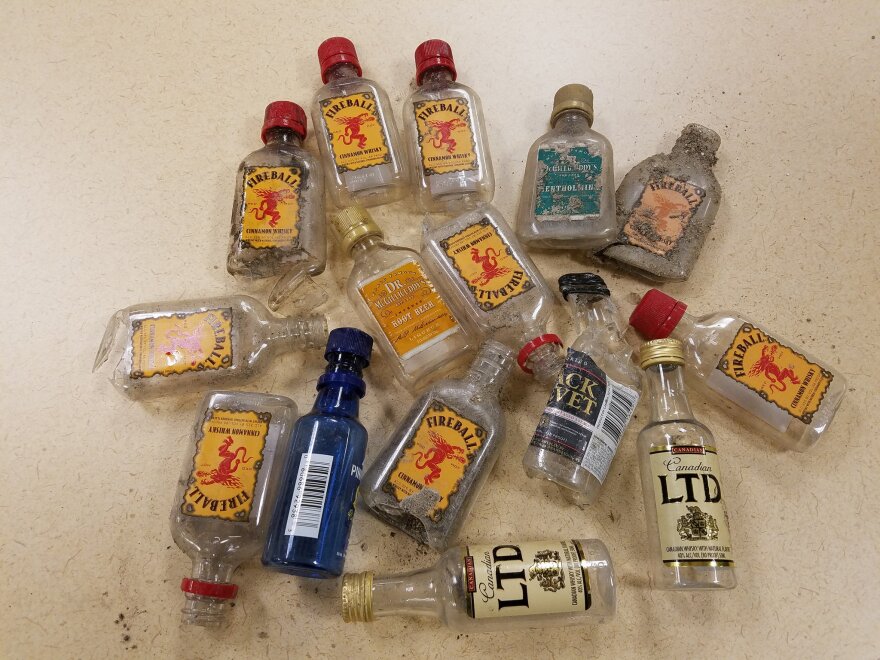Nips, those tiny bottles of booze that Maine Governor Paul LePage wants banned, are here to stay. For now anyway. The Maine Liquor and Lottery Commission voted against the administration’s proposal to outlaw sale of the 50 milliliter bottles, which the governor says were linked to increased incidents of drunken driving and littering.

As the director of the Bureau of Alcoholic Beverages and Lottery Operations, Gregory Mineo walks a fine line between promoting liquor sales in the state and managing the social problems alcohol can present. And despite the skyrocketing sales of nips bottles in Maine, Mineo told members of the commission at a hearing on the proposed ban that the little bottles have to go.
“This size is really about price, portability and concealability,” Mineo.
Which is why Mineo — who has seen nips sales jump from around a half-millon bottles to more than eight million in just a few years, says that no one should be surprised to find thousands of the little plastic bottles all over the ditches and shoulders of Maine highways.
“Many purchasers who predominately frequent convenience stores are consuming this size of spirits in moving vehicles,” Mineo says. “Roadside litter indicates that purchasers of of 50 mls are in fact consuming them in moving vehicles and discarding the empty bottles out the window.”
But there was no one from the Department of Public Safety to back up those claims, a detail that LePage staffers avoided in their presentation to the commission. Aaron Chadbourne, a senior policy adviser to the governor, testified that expanding the state’s returnable bottle law with a five-cent deposit may seem like a reasonable idea, but he sees a problem.
“Now some may argue that the five-cent deposit of the miniature bottles will cause motorists to think twice about whether to toss their empties on the side of the road, but Gov. LePage believes that for those individuals who are already violating Maine’s open container laws and using alcohol while driving, the incentives are far greater to simply discard the evidence of their crime,” Chadbourne says.
But opponents of the governor’s ban request, including Stephen Roop of Auburn, remained passionate. Roop, who owns six liquor stores in Maine, says LePage was simply attempting to extract his revenge on the Maine Legislature for overriding his veto of the bill that attached a deposit to nips bottles.
“This just seems to be a vindictive way for the governor to get back at maybe one or more senators and legislators who dared to go up against him,” Roop says. “I voted for him twice, I don’t think I’d vote for him again and I don’t mind saying that in front of the cameras and if he wants top call me, he knows where I live,” Roop says.
Other ban opponents, such as Rep. Tom Saviello, a Wilton Republican, say the administration should reconsider its efforts to end sales of nips in Maine, which are a considerable source of revenue.
“If you decide to delist them, then I would recommend and would certainly support legislation that would get the state out of the liquor business, you will be walking away from the fourth largest sales item in our business,” Saviello says. “We know that in 2016 about eight million nips were sold and a projected 14 million are supposed to be sold in 2018. I believe this represents a net profit to the liquor budget — not to the general fund — of about $4 million in 2016 and about $8 million in 2018.”
The logic of the proposed ban also eluded Mark Brown, president and CEO of the Louisiana-based Sazerac Co. in Lewiston. More than 50% of all nips sales are bottled by Sazerac and Brown says a ban could result in job losses at his Lewiston plant. He says its hard to believe that nips are solely responsible for an uptick in OUI arrests over the last two years and harder to understand why the governor would link the two together.
“Even if there were evidence to support the correlation and BABLO has presented none, then why will we not be back here in 30 days dealing with a prohibition on other sizes or the banning of alcohol in bars and restaurants,” Brown says. The supposed logic that says prohibit 50 milliliter spirit products decrease OUI risks should apply to all alcohol containers and behavior, should it not?”
The commission voted 4-1 vote against the ban.
This story was originally published on July 11, 2017 at 12:52 p.m. ET.



